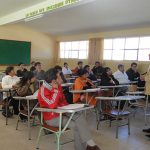The Alma Foundation has partnered with the National University of the Altiplano, the Unidad de Gestión Educativa Local (UGEL) of Urubamba, and the Rural Educational Network of Patacancha in an effort to improve the quality of education in nine remote highland communities that form part of the Patacancha Cuenca in the District of Ollantaytambo. Over the course of eight months, the Alma Foundation will help 25 teachers from both primary and secondary schools obtain a specialization that will strengthen their effectiveness as teachers working within indigenous Andean communities.
The training will develop the competency, abilities, and responsiveness of the teachers. Upon completion of the training, the teachers will receive a second specialty in Didactics in Intercultural Mathematics in Education. This second specialty aims to improve the techniques, methodology, and contextualization of teaching mathematics for children at the primary and secondary school level.
The project also has a goal of fostering cultural preservation within the school system. The course work will allow the teachers to diversify the content of their classes in mathematics with Andean-based techniques and knowledge that is specific to the communities they work in.
This project has emerged as a result of the teachers from the Patacancha Cuenca actively seeking ways to improve their pedagogical methods that, in turn, will result in a higher quality of education. Many have expressed great interest in taking classes to improve their teaching methods; however, few are able to do so because of economic limitations. This project, thus, seeks to improve access to higher education for teachers, particularly for teachers working in indigenous communities often neglected by the formal education system. students
The implementation of this project will directly effect the 25 participating teachers. These teachers’ students — approximately 800 children and young people — will also directly benefit because they will receive a higher quality of education that is contextualized to their reality. Finally, the parents and the broader community will indirectly benefit from this project, particularly given its focus of validating and promoting local knowledge and understanding within the school system. This project will also have a long-term impact on each of the communities because what the teachers learn through this training can be applied for years to come, benefiting generations of future students.
September, 2011 Update
The course has concluded its second semester, and the teachers are very pleased with what they are learning. They are confident that the benefits are translating into a better quality of education for their students. Some of their comments:
“The course is helping me gain a better understanding of how to teach mathematics to children using various concrete materials from our environment, which awakens interest in the children and is being applied in the classroom.”
Aristides Rodriquez Mora
“As a teacher in the community of Pallata, I feel very happy because this helps me work with my pupils with the different strategies that they are providing us with; mathematics is essential for daily life.”
Ruth Andrea Flores Zuniga
“The work we do through the internet is a way in which the teachers can interact, not just with the trainer, but also by asking questions via Facebook and other means, by posting the subject for discussion and receiving different opinions on a mathematical subject because people from different professions related to math use these sites.”
Yuri R. Durand Flores
January 2012 Update
This project has been completed.

